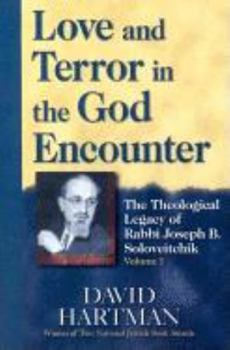Love and Terror in the God Encounter: The Theological Legacy of Rabbi Joseph B. Soloveitchik
Select Format
Select Condition 
Book Overview
The intellectual legacy of one of the 20th century's greatest religious thinkers-explained by a leading modern theologian. Carefully explores Jospeh Soloveitchik's writings, exposing surprising... This description may be from another edition of this product.
Format:Hardcover
Language:English
ISBN:1580231128
ISBN13:9781580231121
Release Date:July 2001
Publisher:Jewish Lights Publishing
Length:240 Pages
Weight:1.18 lbs.
Dimensions:0.9" x 6.2" x 9.3"
Customer Reviews
2 ratings
definitely teaches a lot about Soloveitchik's thought
Published by Thriftbooks.com User , 17 years ago
This book analyzes several of Rav Soloveitchik's responsa and essays, including: *Soloveitchik's essay "Halakhic Man". In this essay, Soloveitchik explains and praises "halakhic man": the self-confident scholar who not only follows halakha, but has a passion for study. The goal of this legal hero is not to know God through mysticism, but to find new legal insights through rigorous analysis. According to Hartman, Soloveitchik "discerns a profound dialectic between relevation and intellectual creativity. Although halakhic man believes that every word of Torah is divine, this very word becomes his possession and plaything." So man does not merely walk obediently with God, but also creates a spiritual civilization through his own interpretive skills. But Hartman's analysis leads to a troubling (for me) question: obviously, a scholar could be highly creative at the time the Mishnah and Talmud were being shaped. But how creative can a scholar be today, when so much of Jewish law has been fixed by thousands of years of evolution? Can someone truly be a halakhic hero in such a world? *Soloveitchik's most famous essay, "The Lonely Man of Faith." In that essay, he explains how man is torn between his desire to dominate and master the world (as shown in the Genesis 1 narrative) and his desire to submit to God. In the latter vision, Man is not satisfied with knowing "the impersonal God of the cosmos" but a more personal God who can provide "relational intensity and intimacy with God." Again, Soloveitchik sees a dialectic: here, between majesty (the human who dominates nature, and who praises God for helping him dominate nature and for creating nature) and intimacy with God. Modern, secular man has difficulty with the second type of relationship. *Soloveitchik's writing on Judeo-Christian theological dialogue. Apparently, Soloveitchik analogizes the Jewish relationship to God to a personal relationship- just as one does not debate an intimate personal relationship, one does not debate an intimate relationship to God with (in Soloveitchik's words) "others whose relationship to God has been molded by different historical events and in different terms." *Soloveitchik's essay on prayer. Soloveitchik has two views of petitionary prayer- first as self-discovery (insofar as the standard words of prayer teach us what our needs ought to be) and second as "acknowledging the unlimited rule of the divine and the complete feebleness of mankind." According to Hartman, Soloveitchik's work involves one difficulty: Soloveitchik writes that because human beings are so helpless before God, "they are dependent upon precedent to dare pray at all ... [and thus he] considered it presumptous to make the slightest change in the forms of prayer ... even spontaneous voluntary prayer." Yet according to Hartman, there is ample halakhic precedent in favor of spontaneous prayer. What was Soloveitchik thinking? Hartman asserts that Soloveitchik overemphasizes th
A honest pupil contends with his beloved teacher
Published by Thriftbooks.com User , 19 years ago
Rabbi David Hartman is a Torah teacher of courage and authenticiy. Here he expounds and contends with the beloved teacher who helped inspire him in ' learning' and ' thought'.This is from Rabbi Hartman's moving introduction." In the course of my philosophical studies and at crucial moments of life when I experienced difficult periods of doubt, and questioned some of the prevailing ,widely accepted theological and moral positions found in the halakhic tradition, he was the figure , the living image that nurtured and sustained my committment. His impact on me during ten yearsof studying with him has never lost its power and influence. Rabbi Soloveitchik represented a Judaism committed to intellectual courage,integrity and openness- the antithesis to dogma and fanaticism" pp.IX-X Rabbi Hartman's dialogue with the work of Rabbi Soloveitchik challenges other understandings of the Rav, and opens up new perspectives for thought. This is like all of Rabbi Hartman's works an illuminating and passionate contribution to the world of Jewish thought.




